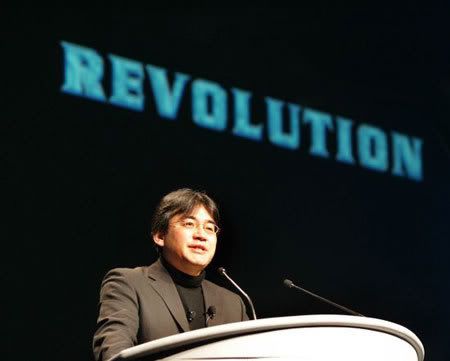 10. Have more open-beta tests. If you've played the Halo 3 beta, or gotten into a Blizzard game beta, you know it's great to try out a game ahead of time. What's great about this is that it's also mutually beneficial, since extra play testing is always good for a game's development, especially if you're going to have a multiplayer aspect. I've read that some ppl would even pay for the opportunity to beta test big games, but I think that's going a little overboard. Of course, if a game really sucks, this could work against a game in its early development stages.. so I guess it depends on the game.
10. Have more open-beta tests. If you've played the Halo 3 beta, or gotten into a Blizzard game beta, you know it's great to try out a game ahead of time. What's great about this is that it's also mutually beneficial, since extra play testing is always good for a game's development, especially if you're going to have a multiplayer aspect. I've read that some ppl would even pay for the opportunity to beta test big games, but I think that's going a little overboard. Of course, if a game really sucks, this could work against a game in its early development stages.. so I guess it depends on the game.9. Allow user-generated content. They have no problem covering their ass with the ESRB disclaimer: "Game Experience May Change During Online Play." Why not use this loop-hole disclaimer and then allow us to create maps, mods, player skins, etc? Console gaming has always been a closed system, compared to the PC. Hopefully Sony can do this w/ private areas in Home, user-made levels in Little Big Planet, and mods in Unreal Tournament 3 for the PS3. Letting a game build a community around itself is vital to the longevity of a game and its sales. If you're friend's really into a game, chances are you'll want to join him.
8. Ditch the "Save Point" mechanic. This has been a staple of console gaming, but I think it's about time for it to go the way of the dodo. Forcing players to use save points is a way for developers to create a artificial layer of difficulty. I also hate it when you have a limited number of save slots. Xbox360 profiles represent one way this is done right, since you see only the game saves associated w/ your gamertag. I guess I come from the PC school of saving, where you can save wherever and save often.
7. Get rid of the load times. This isn't just a console gaming problem, actually, but one that should still be addressed. I thought with the advent of the HDD and muti-core processors, load times would be a thing of the past. I could see the PS3 hard drive being used for a lot of caching.. although the core system (sans a HDD) will always hold the 360 back. Dynamic data streaming has certainly done wonders for open world games like GTA, but you still have that super long, unavoidable, initial load. When you think about games like Killzone 2 for PS3, which has 2GB of art resources, I guess the problem will always be there as textures get larger and environments get more detailed.
6. Acknowledge the fact that there are older gamers out there. Obviously I'm one of them and there are many more gamers like me. I can tolerate the kiddy stuff and movie tie-in games. I was a kid once. But the sterilization of more adult-oriented gaming by stores like Wal-mart, the ESRB, and government legislation has got to stop. If an Unrated DVD can stand on store shelves, why can't games have realistic violence and sexual themes? If developers want to make it andppl want to buy it, I don't see what the problem is. As it stands right now, games are heavily regulated, with no outlet for truly "mature" content. Remarkably, according to the ESA, the average gamer is age 33, but you wouldn't have guessed it by all the restrictions put on developers and publishers.
5. Work to make online a better experience. As of right now, there is no online system that has everything. Xbox Live is very well integrated across all games and friends, but it still lacks dedicated servers and it still costs $$. Sony's PSN service supports dedicated servers and more open content, but is still behind in it's overall structure and integration. They both have their flaws, but together they'd be brilliant. And imagine if there was cross-platform play between 360 and PS3 games. All those damn EA games are the same anyway. This way it'd make it easier to find servers with actual players on them. Really though, all I'd like is to be able to hop online and get into a game quickly and easily. Is that so hard?
4. Stop Nickel and Diming Gamers. Seems like we're on a very slippery slope, with the growing number of micro-transactions available to modern gamers. Map packs are very common now for console games, but unlike their PC counter-parts, these content updates are not free. More and more, it seems like games are being released unfinished, with that "extra" content being sold a month or two down the road. And simply choosing to boycott these micro-transactions doesn't do shit when idiots keep buying them up (just look to the Guitar Hero II song packs for an example of this).
3. Provide a more consistent release schedule. Everyone knows most big games are released around the holiday season (Sept - Dec). It doesn't have to be this way though. This summer has been somewhat of a drought. If only some of those games had come out a bit earlier, it would've given those games more breathing room to sell, and would've given us gamers more time to enjoy them. Instead, this holiday, I'm gonna have to balance all those incredible titles, and some of those gems will get lost in the shuffle. Having a more balanced software release schedule would also help push hardware numbers all year round. Why can't we have the "summer blockbuster" game like the movie industry??
2. Innovation, plain and simple. It seems like the most innovative products are coming from the downloadable games and handheld fronts. These games are usually much cheaper to make and take less time to develop, allowing the designers to take more risks and create truly unique experiences. I like to see this creativity trickle down into the $20 million games as well though. But it's hard when you've got developers like EA that pump out the same carbon-copy games every year. As it becomes harder for companies to turn a profit, less and less developers are looking to unproven game ideas. Sometimes, when you take a chance, the results are truly wonderful, spawning games like Guitar Hero, The Sims, Shadow of the Colossus, and Katamari Damacy.
1. Stop the casual game market trend. I might be alone on this one, but I feel like this is the most important item on this list. The game industry seems to be evolving, morphing to meet the needs of an expanding market. Take a look at this past month's NPD numbers and you'll see what type of game dominates the Top 20 list. Mini-game collection and mass market crap. Publishers are seeing the changing tide and they are responding with things like the EA Sports family mode. And as more PC games slide over to the consoles, in attempt to cash in and get some $$, they seem to be designed with less customizability and simpler game mechanics in mind. I mean, it's okay to make games more appealing to the mass market, but this can also be done without losing the hardcore audience. Blizzard is very good at this approach of making their games very accessible while still keeping them deep and rewarding to those that make the effort. Sadly, it feels like many developers are simply looking for ways to water down the game experience so that "Alpha Moms" and their kids will enjoy themselves.



No comments:
Post a Comment